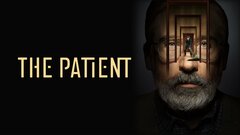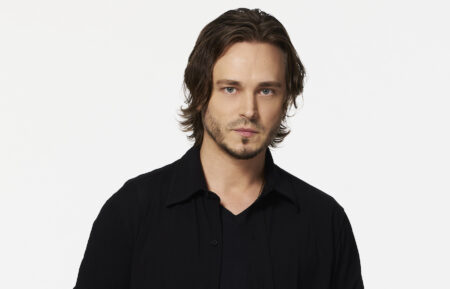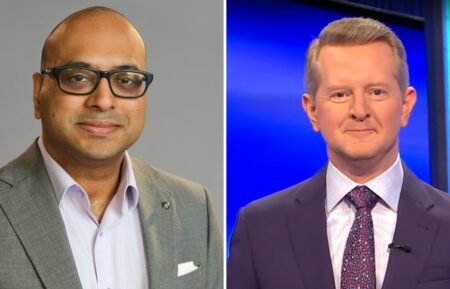‘The Patient’ Finale: Domhnall Gleeson Talks Sam’s Ending & Giving Alan Credit
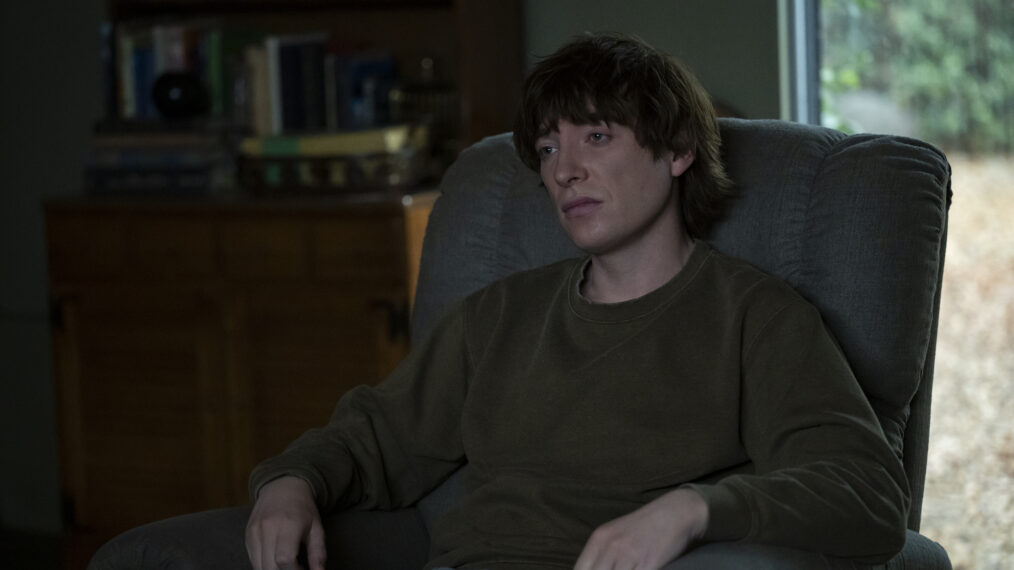
Spoiler Alert
[Warning: The below contains MAJOR spoilers for The Patient finale, “The Cantor’s Husband.”]
There isn’t a happy ending for The Patient.
Sam Fortner (Domhnall Gleeson) killed his therapist, Dr. Alan Strauss (Steve Carell), after holding him captive in his basement, then, though he didn’t turn himself in, gave some closure to his kids by giving them the letter their father had written. And as the series ended, Sam turned to his mother, Candace (Linda Emond), to lock him up in the basement just as he’d chained Alan.
Here, Gleeson breaks down the finale. Plus, would Sam have ever killed his mom?
As twisted as it is, could Sam have gotten to the point of chaining himself up in the basement and giving his mom the key — and her taking it — if he hadn’t killed Alan? He did say he’s never hurt anyone he likes before…
Domhnall Gleeson: I think that the only person who really gets credit in that moment is Strauss. I think Dr. Strauss gets all the credit for what Sam achieves, as much as he achieves. He doesn’t hand himself in, you know what I mean? He doesn’t do the big thing because I think he’s only capable, given what he’s done, of so much change, particularly so quickly.
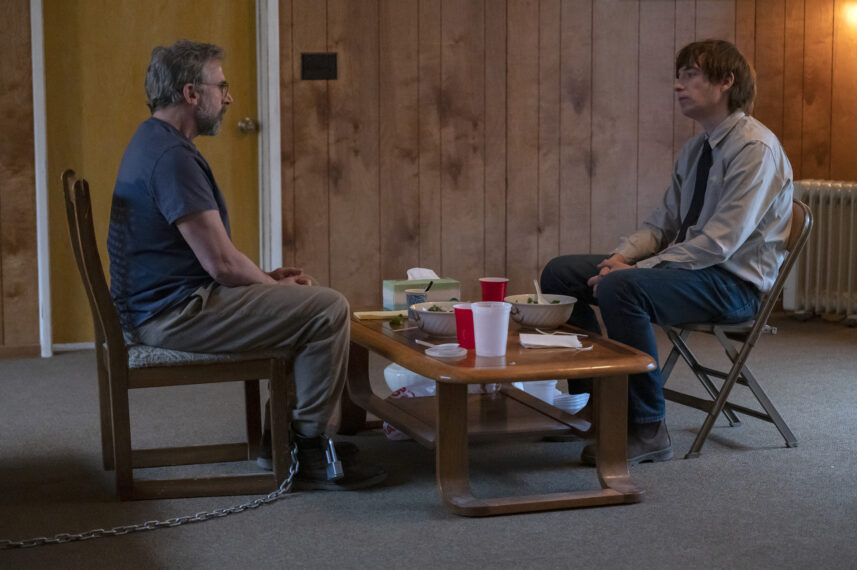
Suzanne Tenner/FX
But I think Strauss gets all the credit for that despite the fact that — yeah, I think you might be right. I don’t know that Sam was ever gonna get there without shocking even himself with somebody who he knows he’s told himself was a good person. He’s always been able to comfort himself saying that people he killed before were bad people, even though they weren’t. I think it needed to get to that stage before he took himself out the equation, yeah.
He also changed in the sense that he gave Alan’s kids the closure they needed and told them where the body was and everything. That also is completely credited to Alan, too, right?
Yeah, that’s part of Strauss’ gift to him and to the world. I think that last letter that he writes is so heartbreakingly beautiful, and just all the humanity of that character comes across in that letter. But in terms of the good he’s done in the world for people outside his family, I think there are very few people who could have brought Sam [to] the place he gets to, even though it’s still not the perfect place. There are very few people who could have gotten him there.
There’s the entire sequence of Sam killing Allen and then dragging him to the grave. That was also a crazy reveal: By the way, there’s a grave in this room.
Yeah, that happens to be behind that door. I have to say, when I read the last script, you worry over the course of a series, you’re like, how does this end in a way where it’s responsible, and yet it’s exciting, and it’s truthful, and yet it’s surprising, how do you do all that? And I thought they just did that so well. I couldn’t believe they had done it that brilliantly, that the grave is already there, so there’s a place to put the [body], the manacles are already there. I just thought they brought all those pieces together in a way that made it so — and then he visits his therapist in his head, which Alan has been doing for the rest of the series. I thought it was pretty much perfect. I thought they did a brilliant job with it.
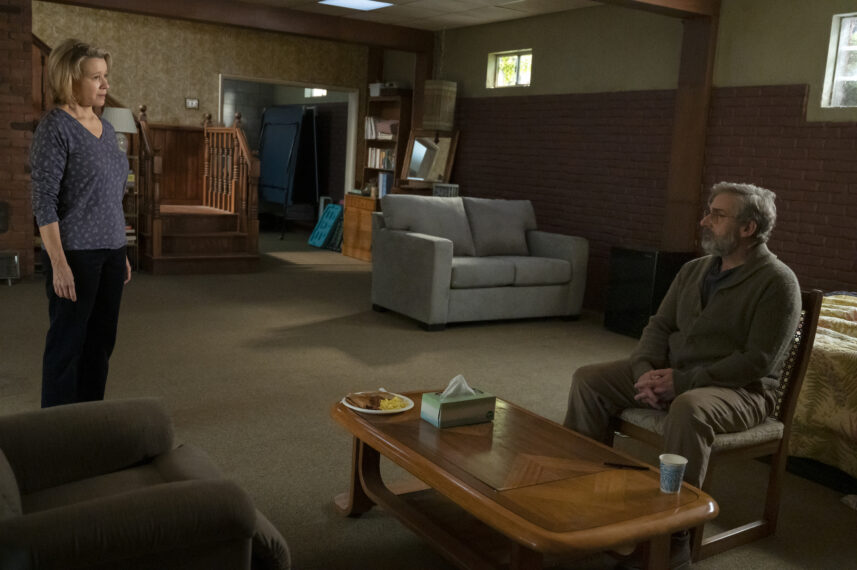
Suzanne Tenner/FX
Do you think Sam would’ve ever killed his mom?
I don’t know. If they had written it, I guess I would’ve believed it because they would’ve written it in a way that was believable. I think the truth is that you just don’t know what he’s capable of. I think that’s probably a step too far. I don’t see him —I think above all else, his ego, his selfishness is something that he’s just got this blind spot to, that he just doesn’t understand how selfish he truly is. And so, I guess, in a way, nothing would surprise me. If that was the thing that was standing in the way, if she said she’s gonna hand him in, or she was gonna do something like that, and it threatened his freedom, or it threatened his ability to control the situation… I think if he feels like he doesn’t have control, things go badly. So you just wouldn’t know.
There were multiple times I thought that Sam would kill Ezra (Andrew Leeds) or have him locked up somewhere. Did you ever get that feeling?
Oh, no, I don’t know that I did. Because also, Alan is so careful with what he reveals of himself. The times that he reveals anything about his own story to Sam, it’s very rare that he tells him about his own life. He says, “I’ve got my own family to get back to.” But then when he says, “I’ve got my own problems with my son and stuff,” that’s late. That would’ve been a great move. That would’ve been a great move for Sam to turn up with his son. That would’ve been awesome. I think maybe we missed a trick there.
Something that stood out was how almost therapy-like Sam’s conversation with his father was about him hitting him. Can you talk about filming that sequence? It was almost putting Sam in the other shoes.
It was as well, but I think for me — and this is not necessarily how it came across or what the Js [executive producers Joe Weisberg and Joel Fields] wanted it to be or even what it is in the show — there were moments where it was coming from a place of basically wanting him to say the thing that would get Sam up enough to be able to do it, to be able to attack him. I don’t know that he’s looking for true closure because I think he’s gone there for a certain reason, that he wants that to happen. I think his father disgusts him. I think what he’s asking for is like, give me one more reason to do this now or give me the adrenaline rush that I need to storm in and do this now. I think that’s part of it. I’m not sure how interested he genuinely is in finding anything out about his father. He hates him, and for good reason.
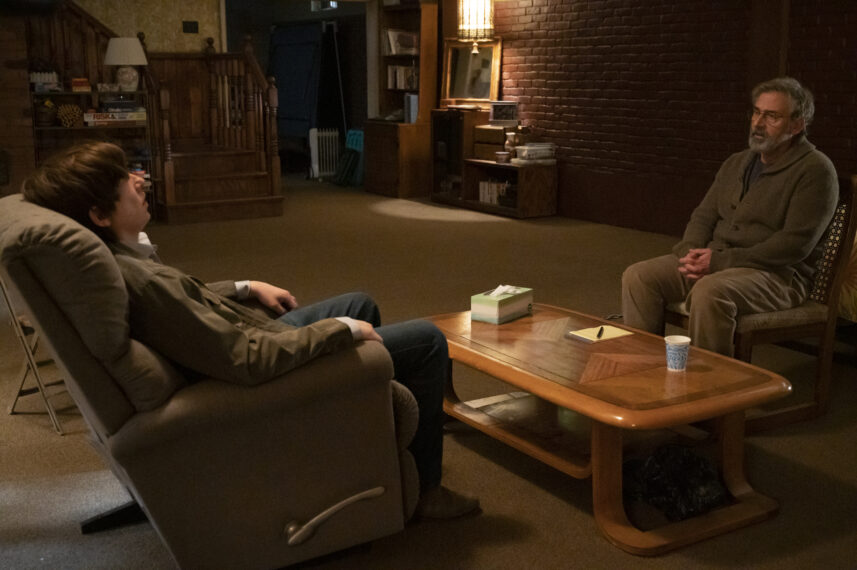
Suzanne Tenner/FX
There was always the ever-present threat of Sam killing Alan, but do you think there was a turning point that he knew he would have to definitely do that before Alan threatened his mom?
Yeah, I think he’s been playing with it for a while. He’s been playing with that notion for a while and has been open about it. He says it to Alan. He almost asks Alan to talk him through it, which is so sad. And he’s talking to a different therapist, and he’s just looking to blame other people for his own shortcomings, which is a big theme in his life, obviously. And if he can’t deal with that, generally the way that he’s dealt with it is eventually he kills somebody, whether he wants to or not, or whether he deep down wants to or not. His compulsions will overcome him. So yeah, I think the possibility’s been in his mind for a while.
Speaking of those compulsions, do you think Sam can ever be let out of that basement?
No, I think in a responsible world in which he is responsible, or anybody around him is responsible, certainly not after like a week of therapy or however long they were in that room. Certainly not after a couple of weeks of therapy. That’s not gonna do it, you know what I mean? That is a long-term goal that involves constant monitoring.
He would have to turn himself in.
Yes, exactly.
What were the most intense and most fun scenes to film?
I had fun nearly all the way through, but it was intense all the way through as well. My favorite days, in a way, were when both happened at the same time. And those were some of the sessions — even the group therapy session with Linda, who plays his mom, and Steve, that was like, this is a messed up bunch of people. It kind of made me laugh, but it kind of terrified me all at the same time. The scenes with his ex-wife — [Emily Davis] is such a brilliant actress — were fun and really sad at the same time. But yeah, anytime you’re sat across from Steve, I think both those things are gonna happen because it’s such an intense situation, and he was so brilliant and made me care about him so much that it felt like it was happening all the time.
Your dynamic — you and Steve worked so well together — is a large part of why I could not stop watching.
Oh, I’m delighted. He’s such a compelling actor. He just was so interesting at every turn, and he never did this thing that I can only imagine would be such a temptation for so many lesser actors, which was to wink at the audience about what he was doing, about what he was really thinking. He never let Sam know more than he should. He never gave away more than that character would. But it just makes you continue to lean in, continue to lean in. I thought it was just such a superb performance.
The Patient, Streaming now, Hulu


